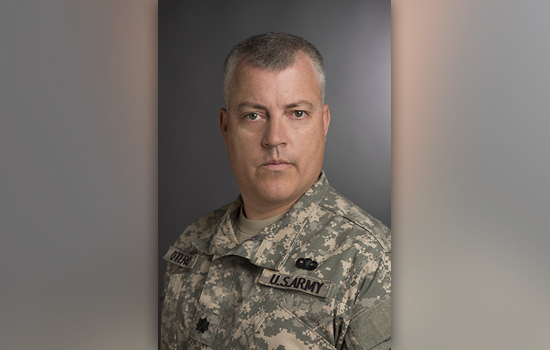New Army ROTC commander appointed at RIT
Lt. Col. Christopher Otero named to leadership position bringing background in military intelligence and combat experience overseas
Lt. Col. Christopher Otero
Lt. Col. Christopher Otero is the new commanding officer of the Army ROTC program at Rochester Institute of Technology. Otero began service with the university in early July, succeeding Lt. Col. Edward Whitaker, who was reassigned this summer.
Senior officers of Otero’s rank have several avenues they can pursue—from the operational track, which he did for a time, to staff positions among the Army’s top organizations such as the Pentagon. They can also compete for the highly selective ROTC positions at 273 universities across the country to help prepare tomorrow’s Army leaders, imparting critical thinking skills for operations as well as pragmatic skills in the use of technology for defense, he said.
“I was surprised and delighted to get my first choice. I really wanted to get involved in the education of our student-cadets,” he said, emphasizing that quality instruction in the ROTC’s classrooms would be a combination of theory and history along a backdrop of real-world experiences from the cadre leadership. “Cyber technology as well as STEM disciplines is huge in the military today and looking at some of the skills the students are getting here at RIT will be a very good fit for what is needed.”
He saw the value of understanding how that technology can be used in different roles throughout his career. Otero began in the Army in 1997 as an armor officer, assigned to posts stateside in Ft. Polk (Louisiana) and at Ft. Drum (New York) in addition to overseas in Korea. He transitioned to military intelligence in 2002 and had several tours in Afghanistan and Iraq as a brigade intelligence officer, battalion executive officer, a border police mentor for the Afghan Border Police and as an intelligence officer supporting a variety of other organizations. During his service, he traveled extensively around the world, including study at the French Joint Staff College in Paris.
“I don’t expect to just tell a lot of war-stories, instead I plan on linking experiences to learning objectives. I think experiences serve as a good frame of reference for dialog, and the situations in Afghanistan and Iraq can provide context for current classes. We have a good crew here,” he said, adding that providing basic weapons instruction is different than teaching leadership, ethics and administration. “One is a manual, repetitive task, the other is more of a high end, intellectual pursuit. But the learning is valuable for both in the military, and that will come from dialog with the students because you have to actively engage people to teach. It is going to be great to sit with the students and talk to them about what these international conflicts mean, and what are some of the lessons learned that can be used in their future roles as officers.”
RIT’s Army ROTC program, the Tiger Battalion, began at the university in 1967. Upon completion of the program, the student-cadets graduate with RIT degrees in their respective academic fields and are also commissioned as Army second lieutenants. The battalion and individual cadets have been recognized throughout their time at RIT for outstanding achievements in various national leadership and development course activities involving cadets from around the country.
“I want to be able to produce good lieutenants,” Otero said. “I think I owe it to my friends still in the service to provide good quality officers, that when they get them into their formations they’ll be able to say, ‘I know your colonel, he did right by me and sent me someone who is ready to be a good lieutenant.’ That matters to me a whole lot and is key to one of the reasons I took the job.”
The RIT Army ROTC program also afforded Otero, a Syracuse native, a chance to return to New York. He and his wife, Kristie, relocated to the area earlier this summer with their two daughters, Emily and Meaghan.














